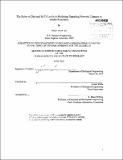The roles of diet and SirT3 levels in mediating signaling network changes in insulin resistance
Author(s)
Lee, Nina Louise
DownloadFull printable version (7.963Mb)
Alternative title
Signaling network changes in high fat diet-induced insulin resistance
Other Contributors
Massachusetts Institute of Technology. Department of Biological Engineering.
Advisor
Forest White.
Terms of use
Metadata
Show full item recordAbstract
The goal of my research is to understand the mechanism by which high fat diets mediate insulin sensitivity and the role SirT3 plays in high fat diet-induced insulin resistance. Insulin resistance is defined as the inability of cells and tissues to respond properly to ordinary amounts of insulin and is a precursor to many metabolic diseases such as diabetes and cardiovascular disease. Obesity, brought on in large part by caloric excess from high fat diet feeding, is a major contributor to insulin resistance. The recent drastic increase in the prevalence of obesity makes it imperative that steps are taken to more effectively treat and cure obesity-linked diseases such as diabetes. To identify optimal therapeutic targets, it is crucial to first gain a mechanistic understanding of obesity-induced insulin resistance, and understand how specific changes in the signaling network affect insulin sensitivity. Previous work has demonstrated that levels of SirT3, a mitochondrial protein deacetylase, are diet dependent. Additionally, SirT3 expression levels have been shown to mediate insulin and glucose tolerance in animals in a diet-dependent manner. Perturbations in SirT3 levels also alter the levels of phosphorylation on several canonical insulin signaling proteins. In my research, I further investigated the link between SirT3, diet and insulin resistance from a signaling network perspective. Using mouse liver as a model system, I analyzed liver tissue from mice fed a normal diet (insulin sensitive) or mice fed a high fat diet, thus inducing insulin resistance. Quantification of phenotypic and network events in response to insulin and utilization of computational techniques revealed activated pathways and nodes mediating insulin response, some of which had not been previously associated with the canonical insulin signaling network. I extended the study to analyze the role SirT3 plays in diet-mediated insulin sensitivity by perturbing the level of SirT3 in mice on both normal chow and high fat diets. The results of this research are useful for designing more efficacious therapies to treat insulin resistance-induced diseases.
Description
Thesis (S.M.)--Massachusetts Institute of Technology, Dept. of Biological Engineering, 2013. Title as it appears in MIT Commencement Exercises program, June 2013: Signaling network changes in high fat diet-induced insulin resistance Cataloged from PDF version of thesis. Includes bibliographical references (p. 73-80).
Date issued
2013Department
Massachusetts Institute of Technology. Department of Biological EngineeringPublisher
Massachusetts Institute of Technology
Keywords
Biological Engineering.